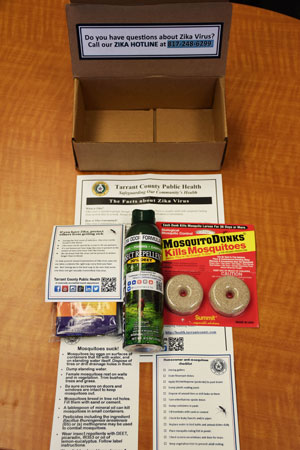Two more cases of Zika virus have been confirmed in Tarrant County, bringing the total positive cases in the county to three.
"There's really no local risk of transmission at this point," said Vinny Taneja, director of public health for Tarrant County.
According to Taneja, the cases were imported into the United States after the patients traveled internationally in late January, early February. The first patient traveled to Puerto Rico while the second traveled to El Salvador.
Test results for both took longer to process because their samples were sent to labs only available outside the region. It was not until February that Tarrant County was able to establish testing labs within this area.
"I think the entire country was sending tests to either their state or the CDC lab," explained Taneja, "So, sometimes it takes awhile when there's a lot of backlog."
 Tarrant County Public Health Department
Tarrant County Public Health DepartmentAs a result of the increase in cases, Taneja and his team have launched a new effort in hopes of stopping the virus from spreading further in North Texas. They've created Zika Home Care Kits for people currently under evaluation for the virus in Tarrant County.
Local
The latest news from around North Texas.
"We wanted to create a very easy to carry education tool," said Taneja. "The idea is that we would visit with these individuals and talk about preventative measures."
The kits include a safety checklist, bug spray, chemicals to kill mosquito larvae and condoms-to prevent sexual transmission of the virus.
During wetter months, Taneja believe it's important to take extra precaution. The Aedes mosquito, which can carry the virus, breeds quickly in standing water throughout North Texas.
"You need to protect yourself against mosquito bites," said Taneja. "If they don't have the educationthat they might be able to transmit it to the mosquitos and to their families, that's where the risk is. So, this kit is an educational tool."
Zika is typically mild with symptoms (fever, rash, joint pain, and conjunctivitis) lasting no more than seven days, however it can pose significant threat to a child in utero.
Research released Friday strengthens the case that Zika causes a serious birth defect called microcephaly — babies born with abnormally small heads — by targeting embryonic brain cells. The Zika virus may also be linked to a wider variety of "grave outcomes" for developing babies than previously reported.
The health department reports there have been no cases of Zika virus transmitted inside Tarrant County. There have been four cases of Zika confirmed in Dallas County, one transmitted locally through sexual intercourse, health officials said.
While sexual transmission of Zika is more common than once thought, the virus is primarily transmitted through mosquito bites -- so in addition to practicing safe sex, Zika prevention techniques include those used to curb the spread of West Nile virus.
In Dallas County, health officials are distributing door hangers in several neighborhoods to provide information on how the virus is spread.
County residents with questions about the virus can call the health department’s Zika Hotline at 817-248-6299.
With recent heavy rainfall, residents across North Texas are encouraged to remove all standing water to minimize the number of mosquito breeding grounds and to follow the guidelines below.
- Dress in long sleeves, pants when outside: For extra protection, spray thin clothing with repellent.
- DEET: Make sure this ingredient is in your insect repellent.
- Drain standing water in your yard and neighborhood: Mosquitoes can develop in any water stagnant for more than three days.
It has been recommended in the past that to avoid mosquito bites you should avoid being outdoors during Dusk and Dawn (the 4 Ds). While this is true for mosquitoes that commonly carry the West Nile virus, other types of mosquitoes that are more likely to carry Zika, dengue and chikungunya are active during the day. When outdoors, no matter what time of day, adjust your dress accordingly and wear insect repellent containing DEET, picaridin or oil of lemon eucalyptus as your first line of defense against insect bites.



